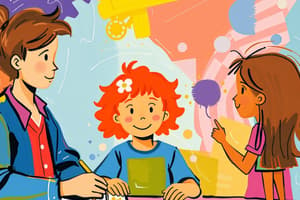Podcast
Questions and Answers
Which trait is essential for resolving conflicts and improving outcomes within a team?
Which trait is essential for resolving conflicts and improving outcomes within a team?
- Flexibility
- Reliability
- Determination
- Empathy (correct)
What best describes a strong work ethic in early childhood education?
What best describes a strong work ethic in early childhood education?
- Being prepared and following through on commitments (correct)
- Having a flexible schedule
- Networking with other professionals
- Striving for promotions
How does a positive attitude affect the learning environment in early childhood education?
How does a positive attitude affect the learning environment in early childhood education?
- By creating an engaging and dynamic space (correct)
- By limiting children's creativity
- By making it more formal
- By fostering rigid structures
What does being an advocate for children and their families require?
What does being an advocate for children and their families require?
What is a key component of professionalism in early childhood education?
What is a key component of professionalism in early childhood education?
Which of the following best describes professionalism in early childhood education?
Which of the following best describes professionalism in early childhood education?
What aspect of professionalism helps in building trust and understanding?
What aspect of professionalism helps in building trust and understanding?
Why is ongoing professional development important for educators?
Why is ongoing professional development important for educators?
Which behavior is NOT a part of embodying professionalism as an early childhood educator?
Which behavior is NOT a part of embodying professionalism as an early childhood educator?
What is a critical factor in creating an engaging lesson plan for young children?
What is a critical factor in creating an engaging lesson plan for young children?
Which of the following is essential for adapting to the diverse needs of children?
Which of the following is essential for adapting to the diverse needs of children?
How does professionalism contribute to lifelong learning for children?
How does professionalism contribute to lifelong learning for children?
What role does non-verbal communication play in professionalism?
What role does non-verbal communication play in professionalism?
Match the following traits associated with early childhood educators to their descriptions:
Match the following traits associated with early childhood educators to their descriptions:
Match the following aspects of a strong work ethic to their definitions:
Match the following aspects of a strong work ethic to their definitions:
Match the following characteristics of professionalism in early childhood education to their significance:
Match the following characteristics of professionalism in early childhood education to their significance:
Match the following outcomes of embodying positive traits in early childhood education to their impacts:
Match the following outcomes of embodying positive traits in early childhood education to their impacts:
Match the following components of effective teamwork in early childhood education to their related features:
Match the following components of effective teamwork in early childhood education to their related features:
Match the aspects of professionalism in early childhood education with their descriptions:
Match the aspects of professionalism in early childhood education with their descriptions:
Match each concept to its importance in early childhood education:
Match each concept to its importance in early childhood education:
Match the types of communication with their characteristics:
Match the types of communication with their characteristics:
Match each behavior with its effect on the learning environment:
Match each behavior with its effect on the learning environment:
Match the element of professionalism with its requirement:
Match the element of professionalism with its requirement:
Match each type of relationship with its significance:
Match each type of relationship with its significance:
Match the principle of professionalism with its outcome:
Match the principle of professionalism with its outcome:
Match the development-focused principle with its description:
Match the development-focused principle with its description:
Study Notes
Professionalism in Early Childhood Education
- Professionalism is crucial for fostering a positive and effective learning environment in early childhood education.
- Key components include educators' presentation, interactions, and commitment to their roles.
Presentation and Communication
- Dressing appropriately reflects respect for the profession and facilitates active engagement with children.
- Effective communication encompasses clear verbal and respectful listening skills, alongside non-verbal cues such as body language.
- Being approachable and responsive helps in building trust with children, families, and colleagues.
Knowledge and Continuous Improvement
- Continuous learning about research, trends, and best practices is essential for understanding developmental milestones and diverse needs of children.
- Participation in ongoing professional development, like workshops and courses, enhances educators' knowledge and skills.
Educational Planning and Execution
- High-quality education involves crafting lesson plans that are developmentally appropriate, engaging, and inclusive.
- Maintaining a safe and inviting learning environment is key, alongside regularly assessing teaching practices for improvement.
Relationship Building
- Strong relationships with children, families, and colleagues promote a supportive and collaborative environment.
- Empathy, patience, and teamwork are necessary for fostering positive interactions;
- Openness to feedback and constructive dialogue is important for conflict resolution and improved outcomes.
Work Ethic and Advocacy
- A strong work ethic is demonstrated through reliability, punctuality, and a commitment to professional duties.
- Educators should take responsibility for their actions, strive for excellence, and take pride in their work.
- Professionals act as advocates for children and families, seeking to positively impact learning and development.
Attitude and Adaptability
- A positive, enthusiastic attitude enhances the learning environment, making it dynamic and engaging.
- Flexibility and adaptability are important traits, allowing educators to embrace change and learn from experiences.
Culture of Growth and Respect
- Professionalism in early childhood education transcends mere compliance with standards; it emphasizes the importance of fostering a culture of respect, growth, and continuous improvement.
- High-quality care and education should support the holistic development of young children through the embodiment of professionalism in practices.
Professionalism in Early Childhood Education
- Professionalism is crucial for fostering a positive and effective learning environment in early childhood education.
- Key components include educators' presentation, interactions, and commitment to their roles.
Presentation and Communication
- Dressing appropriately reflects respect for the profession and facilitates active engagement with children.
- Effective communication encompasses clear verbal and respectful listening skills, alongside non-verbal cues such as body language.
- Being approachable and responsive helps in building trust with children, families, and colleagues.
Knowledge and Continuous Improvement
- Continuous learning about research, trends, and best practices is essential for understanding developmental milestones and diverse needs of children.
- Participation in ongoing professional development, like workshops and courses, enhances educators' knowledge and skills.
Educational Planning and Execution
- High-quality education involves crafting lesson plans that are developmentally appropriate, engaging, and inclusive.
- Maintaining a safe and inviting learning environment is key, alongside regularly assessing teaching practices for improvement.
Relationship Building
- Strong relationships with children, families, and colleagues promote a supportive and collaborative environment.
- Empathy, patience, and teamwork are necessary for fostering positive interactions;
- Openness to feedback and constructive dialogue is important for conflict resolution and improved outcomes.
Work Ethic and Advocacy
- A strong work ethic is demonstrated through reliability, punctuality, and a commitment to professional duties.
- Educators should take responsibility for their actions, strive for excellence, and take pride in their work.
- Professionals act as advocates for children and families, seeking to positively impact learning and development.
Attitude and Adaptability
- A positive, enthusiastic attitude enhances the learning environment, making it dynamic and engaging.
- Flexibility and adaptability are important traits, allowing educators to embrace change and learn from experiences.
Culture of Growth and Respect
- Professionalism in early childhood education transcends mere compliance with standards; it emphasizes the importance of fostering a culture of respect, growth, and continuous improvement.
- High-quality care and education should support the holistic development of young children through the embodiment of professionalism in practices.
Studying That Suits You
Use AI to generate personalized quizzes and flashcards to suit your learning preferences.
Description
This quiz explores the essential aspects of professionalism in early childhood education. It covers behaviors, skills, and attitudes that educators must embody to foster a positive learning environment. Understanding these elements is key to maintaining effective relationships and promoting collaboration in educational settings.




